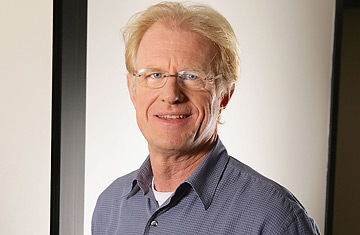
Actor Ed Begley Jr.
Think Hollywood, and sustainability may not be the first word to cross your mind. Porsches and private jets, Cristal and cocaine, the entertainment industry has been the embodiment of American overconsumption, and its chief sales agent to the rest of the country. Recycling? That was for plot lines. But side-by-side with that image of excess is Hollywood the dyed-blue liberal, the city that gave Al Gore an Oscar before he won that Nobel, where solar panels and Priuses are the new must-have toys, and someone actually thought global warming would make for a good action movie.
If there's a mayor of that second Hollywood, it's the actor Ed Begley Jr., who's been evangelizing the environment since the 1970s, back when we were more worried about an ice age than global warming. The green-living Begley is the star in the electric car — though he's since switched to a hybrid — and his career is a handy measure of how much environmentalism has saturated Hollywood. Organic to his biodegradable core, Begley says that when he first began to preach the gospel of green, telling his friends and colleagues about his forays into recycling or alternative power, "they thought it seemed kind of crazy," he says. But now Begley and his wife Rachelle star in an environmental reality TV show —Living With Ed, on HGTV — and he can feel the effect his example has had. "People tell me that all the stuff I've done has had an impact on them doing the same," says Begley. "It's made them change."
Now Begley and some of his colleagues are trying to green the way Hollywood does business, not just the way it lives. On Dec. 11 and 12 industry insiders will attend the first Hollywood Goes Green summit, a networking conference designed to plot out ways to cut out waste and improve energy efficiency in film, TV and music production. The entertainment industry is vast, and as in any big business, the environmental benefits of switching to greener practices are equally significant. "We've come a long way from the wasteful ways of the past," says Begley, who will be giving a keynote address at the conference — a sign of his influence. "But there's still so much more we can do, on and off the set." (Listen to Begley talk about the summit and his environmental past on this Greencast.
Some of those changes are elementary — producers shouldn't just recycle, they should aim to buy recycled paper the first time around. Instead of using polluting diesel generators on the set, filmmakers could buy ones that run on less-carbon intensive biodiesel — which, Begley points out, has the additional benefit of "smelling like French fries instead of diesel gas." But some of Begley's suggestions would seem to challenge the star system of at the heart of the Hollywood galaxy. Why, he asks, should we reserve singe cars for celebrities? "Load it up," exhorts Begley. "Get some grips and electricians riding in that car, too. I don't need to ride alone."
It's a little tough to envision superstars car-pooling, but there is evidence that Hollywood sees green as more than just the color of the box office receipts. The producers of the Steve Carrel comedy Evan Almighty worked with the Conservation Fund to make the film carbon neutral, from the first script sessions to the ultra-light DVD packaging. (The movie bombed, but at least it made a lighter impact on the Earth when it did.) This season the action show 24 will set the standard for green production, with all-recycled scripts, biodiesel power and LED lights. (Jack Bauer will not begin chasing terrorists in an L.A. city bus, however.) Given Hollywood's penchant for copying success, if a hit like 24 goes green, expect the rest to follow.
Even if that happens, however, a green Hollywood still can't escape an essential contradiction: To save the Earth, we're told we need to live simpler, consume less — in other words, turn down the wattage of our lives. But from the giant Hollywood sign on down, the entertainment industry has always been about living large. "There can be something hypocritical about it," admits Begley. "But if people are doing everything they can, whether they're a movie star or an electrician, I think they can make a difference."
Even a light green Hollywood is better than the alternative.
